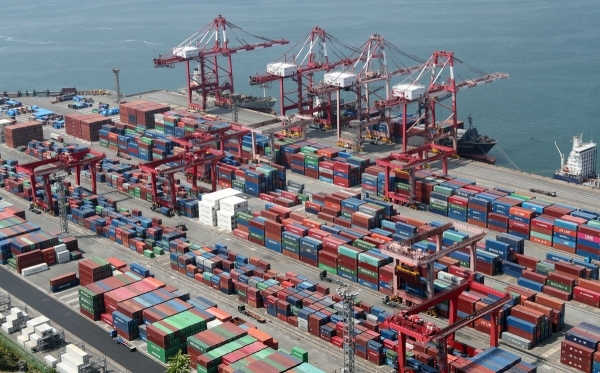South Korea’s exports fell 10.9 percent in June marking the fourth consecutive month of decline amid the fallout from the new coronavirus pandemic, data showed Wednesday, although the pace slowed as major economies around the globe slowly began to resume business activities.
Outbound shipments came to $39.2 billion last month, compared with $44 billion posted a year earlier, according to the data compiled by the Ministry of Trade, Industry and Energy.
The June tally marked the fourth straight month that the country’s exports declined.
Imports also surrendered 11.4 percent to $35.5 billion, resulting in a trade surplus of $3.67 billion. The country snapped its 98 straight months of having more exports than imports in April, before rebounding to the black in May.
The June decline was roughly in line with what the market had expected. According to a poll by Yonhap Infomax, the financial arm of Yonhap News Agency, the country’s June exports were estimated to have declined by 9 percent compared with a year earlier.
The slower pace of the decline in exports came as major economies around the globe slowly resumed their business activities, along with a calendar effect, as there were more working days in the month.
Outbound shipments of chips, the mainstay good, remained nearly unchanged from the previous year at $8.3 billion, accounting for roughly 21 percent of the total exports, as overseas firms reduced facility investment, coupled with the slow global demand for smartphones.
Due to the virus pandemic, exports of other major products continued to lose ground, although some products showed an improvement from the previous month.
Exports of automobiles dropped 33.2 percent in June from the previous year, due to the weak demand from the US and European markets, while local production lines were also disturbed by the pandemic. The figure nevertheless slowed from a 54 percent on-year drop posted in May.
Overseas sales of auto parts moved down 45 percent as major carmakers around the globe scaled down their production amid rising inventories.
Outbound shipments of petrochemical products plunged 11.8 percent on-year in June due to lower oil prices. Exports of petroleum products also nearly halved on-year.
Sales of a handful of segments, on the other hand, gathered ground.
With a rising number of people working from home, exports of computers soared 91.5 percent over the cited period. Shipments of biohealth products and foodstuffs also jumped a whopping 53 percent and 11.7 percent, respectively, amid the global pandemic.
By destinations, exports to China, the top trading partner of South Korea, rebounded for the first time in six months by 9.5 percent in June from a year earlier as the world’s No. 2 economy resumed its business activities.
Outbound shipments to other major partners, however, continued to remain in negative terrain as the COVID-19 pandemic lingered.
Exports to the United States dropped 8.3 percent in June on-year, although it improved from a 29 percent drop posted a month earlier. The US is the most hard-hit nation by the pandemic.
Shipments to the European Union decreased 17 percent on-year in June.
Amid the yearlong trade row with Japan, South Korea’s exports to the Asian neighbor dropped 17.8 percent in June on-year. Seoul and Tokyo have been at loggerheads since July last year, after Japan abruptly rolled out restrictions on exports of key industrial materials to South Korea.
“In the second half of 2020, more countries are anticipated to resume their business activities, which will lead to more investment,” Industry Minister Sung Yun-mo said. “South Korea will spare no efforts to help exporters take advantage of the opportunity.”
Before the new coronavirus delivered a full-fledged impact on the global economy, South Korea enjoyed a 4.5 percent rise in its outbound shipments in February, the first on-year rebound in 14 months.
But the country’s outbound shipments declined in March, and its pace further accelerated, plunging 25.5 percent in April and 23.6 percent in May as major trade partners closed their borders and suspended business activities.
South Korea’s exports dipped by more than 10 percent in 2019 due to lower chip prices and the trade war between the United States and China.
“As the recovery of exports will depend on the progress of the COVID-19 pandemic, we cannot provide a detailed forecast at the current stage,” an official from the ministry said.
Hit by a slump in exports and facility investment, Asia’s fourth-largest economy is expected to contract 1.2 percent this year, according to the Organization for Economic Cooperation and Development (OECD).
The updated prediction, which would be the sharpest contraction since the 1998 Asian financial crisis, marked a sharp downgrade from the OECD’s March forecast of a 2 percent expansion.
The country has been considered one of the most successful countries in containing the spread of the highly infectious disease, although recent sporadic group infections have been popping up in greater Seoul, with around 12,800 COVID-19 patients reported here so far since Jan. 20. (Yonhap)


